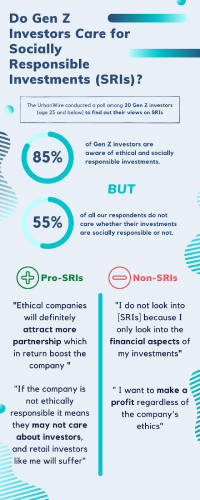More Gen Zs are trying their hand at trading and investing in the financial market. With the rise of robo advisors and trading apps that offer free trades and low fees, young Singaporeans are finding it easier to start investing with a small capital.
But how many of them care if they are investing in a “woke” way? Do they want their money parked only in socially responsible investments (SRI)?
The UrbanWire conducted a straw poll with 20 individuals aged 24 and below. We found that 85 per cent of them are aware of socially responsible investments (SRI). But slightly more than half of them – 55 per cent – say they do not care whether their investments generate positive social and environmental impact or not.

For example, Tay Jing Xun, 22, said his primary goal is “yielding the best interest” for himself. He’s invested in ETFs, unit trust and cryptocurrencies so far.
Similarly, for Zaccheaus Chau, a 19-year-old who invests in cryptocurrencies, his investment goal is “to make as much money as possible”.
“I will invest in absolutely anything that makes me money,” he added.
However, Tan Soon Yuen, Richmond, 24, believes that while financial returns are important, they should not come at the expense of environmental quality and social well-being.
The final-year National University of Singapore student, who’s also a Great Eastern financial advisor, invests in stocks, cryptocurrencies and private annuities. He believes his investments “should contribute to the betterment of society”.
In recent years, more global banks like Standard Chartered and asset managers like BlackRock are encouraging investors to park their funds in companies that score well in the environmental, social and governance (ESG) aspects.
Singapore’s DBS Bank also hopes more investors will warm up to the idea of investing in sustainable companies and industries.
“Many investors still confuse philanthropy with ESG investing,” said a DBS spokesperson, “They think doing good means …[their investments will] underperform.”
“Unlike philanthropy, which is focused on doing good, ESG investing has a dual focus: it’s about achieving financial outperformance in the long-term, whilst also doing good,” she said.
Here are some ESG products to consider if you want to invest responsibly.
BNP Paribas Aqua C Cap (SGD)
This is a mutual fund that invests mainly in companies that tackle water-related issues. At least 75 per cent of the fund is always invested in equities issued by companies in the global water industry.
Vanguard ESG U.S. Corporate Bond Exchange Traded Funds (ETF)
This ETF tracks the performance of the Bloomberg MSCI US Corporate SRI Select Index, and provides dividends from USD-denominated bonds.
These bonds are creditworthy and have a maturity of more than one year. Companies involved in certain industries that go against ESG values are excluded from this ETF.
Firms that do not meet certain diversity criteria or the ESG controversies assessment framework are not included.
Syfe’s ESG & Clean Energy Portfolio
Robo-advisor platform Syfe has a portfolio that invests in equities of high-ESG-rated global companies across different sectors.
The portfolio consists of ETFs that are aligned with clean energy and water sustainability. Companies in the oil and tobacco industry are excluded.
This portfolio also focuses on firms that make a positive environmental impact. New ESG themes are also actively monitored for possible inclusion.
Proofread By: Ruth Loo Hui En and Chew Jia Wei
